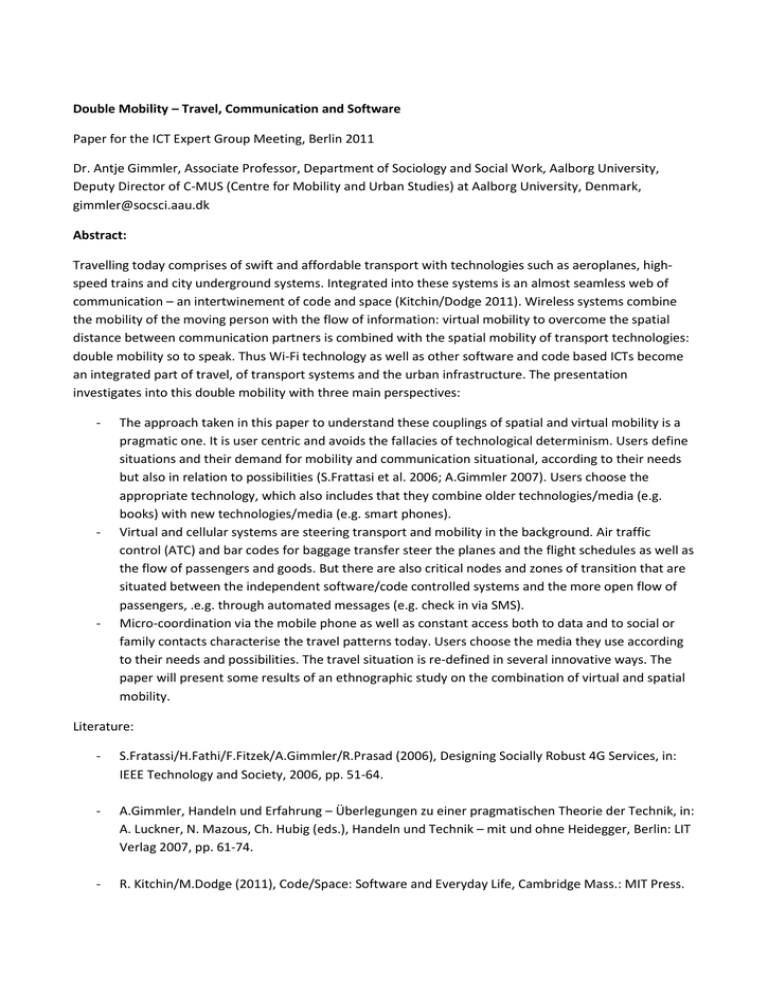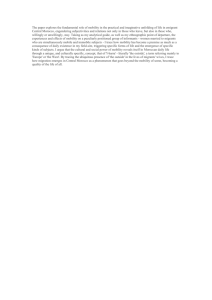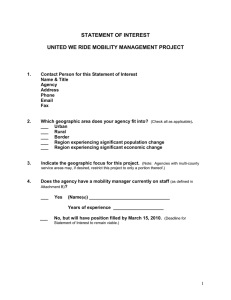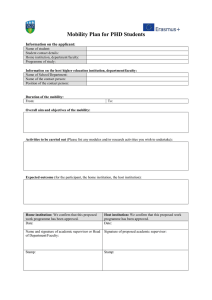Gimmler Abstract ICT Expert group 2011
advertisement

Double Mobility – Travel, Communication and Software Paper for the ICT Expert Group Meeting, Berlin 2011 Dr. Antje Gimmler, Associate Professor, Department of Sociology and Social Work, Aalborg University, Deputy Director of C-MUS (Centre for Mobility and Urban Studies) at Aalborg University, Denmark, gimmler@socsci.aau.dk Abstract: Travelling today comprises of swift and affordable transport with technologies such as aeroplanes, highspeed trains and city underground systems. Integrated into these systems is an almost seamless web of communication – an intertwinement of code and space (Kitchin/Dodge 2011). Wireless systems combine the mobility of the moving person with the flow of information: virtual mobility to overcome the spatial distance between communication partners is combined with the spatial mobility of transport technologies: double mobility so to speak. Thus Wi-Fi technology as well as other software and code based ICTs become an integrated part of travel, of transport systems and the urban infrastructure. The presentation investigates into this double mobility with three main perspectives: - - - The approach taken in this paper to understand these couplings of spatial and virtual mobility is a pragmatic one. It is user centric and avoids the fallacies of technological determinism. Users define situations and their demand for mobility and communication situational, according to their needs but also in relation to possibilities (S.Frattasi et al. 2006; A.Gimmler 2007). Users choose the appropriate technology, which also includes that they combine older technologies/media (e.g. books) with new technologies/media (e.g. smart phones). Virtual and cellular systems are steering transport and mobility in the background. Air traffic control (ATC) and bar codes for baggage transfer steer the planes and the flight schedules as well as the flow of passengers and goods. But there are also critical nodes and zones of transition that are situated between the independent software/code controlled systems and the more open flow of passengers, .e.g. through automated messages (e.g. check in via SMS). Micro-coordination via the mobile phone as well as constant access both to data and to social or family contacts characterise the travel patterns today. Users choose the media they use according to their needs and possibilities. The travel situation is re-defined in several innovative ways. The paper will present some results of an ethnographic study on the combination of virtual and spatial mobility. Literature: - S.Fratassi/H.Fathi/F.Fitzek/A.Gimmler/R.Prasad (2006), Designing Socially Robust 4G Services, in: IEEE Technology and Society, 2006, pp. 51-64. - A.Gimmler, Handeln und Erfahrung – Überlegungen zu einer pragmatischen Theorie der Technik, in: A. Luckner, N. Mazous, Ch. Hubig (eds.), Handeln und Technik – mit und ohne Heidegger, Berlin: LIT Verlag 2007, pp. 61-74. - R. Kitchin/M.Dodge (2011), Code/Space: Software and Everyday Life, Cambridge Mass.: MIT Press.



